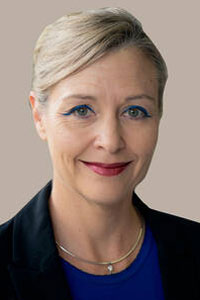
Karlene Willcocks, Acting Executive Director
Galang Nuuruindha! (Welcome – in Turrbal)
Wow! Coming to the end of my fourth week as Acting Executive Director TPCH, I have met some truly amazing people, had some laughs and shared some challenges. One of my most memorable moments this week was a visit with patient, Therese in the Rehabilitation and Acute Stroke (RAS) Unit. Therese, who has been in the RAS Unit for 100 days, had become akin to sitting outside her room near the ward’s reception area jovially conversing with staff and welcoming visitors; earning her the title of ‘Social Director.’ She was very keen to know about the staff caring for her, have a joke with them, and share her own story. Chatting with Therese and watching the staff interact and respond to her with such compassion and warmth, reminded me of the important role we play as health care workers in personalising the patient’s journey. Like all of us, each patient has their own story to tell, and we at TPCH, are part of that person’s journey. No matter how short or long we spend with a patient, how we treat them and make them feel as an individual can make all the difference.
Have your Say survey
This week, our Executive Leadership Team received feedback from the recent Metro North Have your Say staff survey. I am pleased to share that broadly, TPCH made some good gains with the level of engagement with staff having increased since the last survey. This was reflected through our 47% response rate, 2% higher than the previous survey. Sixty-one percent of staff surveyed also said that TPCH is a truly great place to work. These are positive results, considering the survey was run in the post-COVID-19 period and during a time of high demand on our services.
Here is a small selection of TPCH’s results:
Positive areas
- Staff commitment to patient safety
- Positive and equitable work environment
- Supportive colleagues
- Manager conducts annual PDPs
Areas needing attention
- Meeting staff’s most important expectations
- Fair and equitable workloads
- Access to alternative work arrangements to accommodate work/life balance
- Recognition of staff achievements
We expect to receive the full results of the survey by early next month, which will then be rolled out to program areas for further distribution. Targeted support and sessions will be available for areas that require it, and a broader toolkit for managers will be available on QHEPS in due course. More details to come soon.
Executive update
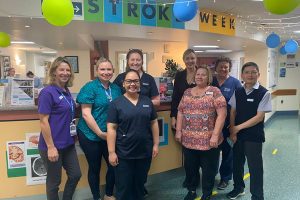
Visit to RAS Unit
This week, I took the time to visit several departments and areas across the hospital, starting off with our Switchboard. It was good to see this busy team in action and continuing to do a stellar job in supporting TPCH patients, staff and the community, within their current physical environment.
This week is National Stroke Week, so I stopped into the Rehabilitation and Acute Stroke (RAS) Unit. It was great to chat with staff in the unit who work together to deliver care to approximately 40 stroke patients each month, during their acute and rehabilitation stages. Some of these patients, like Therese who I mentioned earlier, can spend weeks or sometimes months in the unit recovering depending on the severity of their clinical event. They depend on the skill and compassion of the team to support and lead them through a very uncertain and often frustrating time. A big thanks to Roslyn Blasl, Caitlin Kearney and Sean Yang for taking the time to show me through the unit.
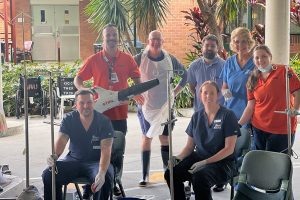
QuEST team at the Hospital-wide Equipment Cleaning day
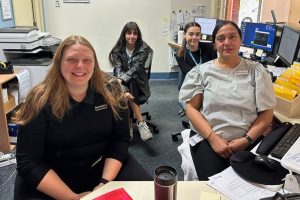
Visit to Specialists Outpatients Department during ESM go live
I also checked in with a number of our outpatient and administration areas including Heart Lung, Specialist and Paediatric outpatient departments, as well as Cardiac Investigations Unit reception and the Administration Hub. Staff from these areas have been diligently working through the transition to the new ESM system which went live this week. Well done!
A/Director of Operations, Heart Lung, Karen Leighton also made a visit to TPCH’s Hospital-wide Equipment Cleaning program coordinated by the QuEST team. (Unfortunately I did not fulfil the photo mission this time!). This program manages the maintenance of clinical equipment and ensures it is fit for purpose. During the day, staff cleaned almost 400 items – an awesome effort. This unique program is another great example of how TPCH is leading the way in supporting our staff and patients. Congratulations to Tracy Nowicki and the entire QuEST team for coordinating such a successful program.
Finally I stopped into the Nursing Workforce Unit where I chatted to staff about current challenges with staffing, especially during these periods of high demand.
Research Excellence Awards
A reminder that nominations for the Metro North 2023 Research Excellence Awards are currently open. These Awards recognise celebrate and recognise the invaluable contribution and incredible achievements made by researchers across the health service.
The categories are:
- Researcher of the Year
- Rising Star Award
- Research Support Award
- Discovery and Innovation Research Award
- Clinical Research Award
- Complex Health Challenges Research Award
- Research Implementation Research Award
- Consumer in Research Award.
Nominations for the 2023 Metro North Research Excellence Awards are now open until Thursday 5pm 17 August 2023. Submit an entry.
Have you ever been brave enough to ask?
What is culture do you identify with/as?
What can I do to make your workplace or stay more culturally acceptable/safe?
When I attended the Courageous Conversations about Race training (a course I highly recommend to all), we were challenged as a group on why many found it confronting, uncomfortable or fearful to ask if a person identified as Aboriginal and/or Torres Strait Islander. It was pointed out to us that in health, we regularly and with out any qualms ask about very personal and private parts of a patient’s life – “have you passed urine/pee’d?” or “have your bowels opened/poo’ed?” (and often at high volume in a shared room!) It makes you think doesn’t it?
Lets challenge ourselves, as unless you ask, do you know what privileged knowledge and care you are missing out on or missing for your colleagues, friends and patients? Of course if people don’t want to talk about it, that is there right but true interest and commitment to making our hospital safe for all is the start of people feeling more comfortable to openly talk to us about their needs.
Culture does NOT come with a look. You have to enquire with interest to have the privilege of sharing that knowledge sometimes.
Accreditation update
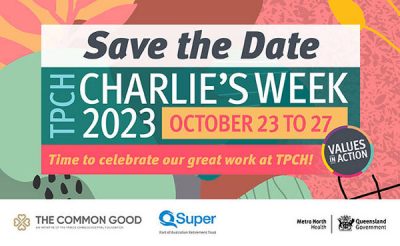 With short notice assessment imminent, it’s time to consider your physical work environment. On recent walk arounds, clutter and decanted linen have been noticed and it is timely to consider this as a focus over the next few weeks. A cluttered environment gives the impression of a lack of cleanliness and confusion, and can affect our patient’s experience. A clutter-free workspace can increase productivity, improve staff morale and can demonstrate to our patients how much pride we have at TPCH for the important work we do.
With short notice assessment imminent, it’s time to consider your physical work environment. On recent walk arounds, clutter and decanted linen have been noticed and it is timely to consider this as a focus over the next few weeks. A cluttered environment gives the impression of a lack of cleanliness and confusion, and can affect our patient’s experience. A clutter-free workspace can increase productivity, improve staff morale and can demonstrate to our patients how much pride we have at TPCH for the important work we do.
We are aware that the decanting of linen from trolleys is in response to needing access to linen when the trolleys are replaced in the afternoon period. If your clinical area is undertaking this practice, it is essential that the clean linen is being placed in a clean and dry place that prevents contamination by aerosols, dust and moisture. Additionally, clinical areas must have a process to rotate decanted linen. Please take some time over the coming weeks to walk around your clinical area and consider it through the eyes of our patients and of an accreditation assessor.
FAST FACTS
This week we’ll profile the Podiatry team.
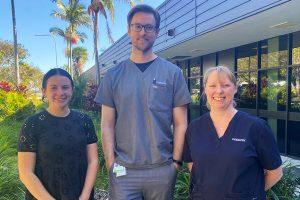
Members of the Podiatry team
Did you know?
- TPCH Podiatry team consists of three staff providing High-Risk Foot services across all inpatient wards, emergency department, as well as an outpatient Foot Ulcer Clinic.
- The High-Risk Foot Service cares for people with an active foot ulcer or pressure injury – ankle and below, or those at risk of developing a foot ulcer. It also completes bedside vascular assessments for concerns regarding foot perfusion. Patients do not have to be diabetic to access the service.
- This year so far, the service has delivered over 3,000 moments of care to 250 patients in the pursuit of avoiding amputations and hospitalisations.
- Podiatry conducts weekly clinics with the Infectious Diseases team, and monthly multi-disciplinary clinics with Orthopaedics, Orthotics and Prosthetics.
- TPCH provides a two-day per week Orthopaedic Triage Podiatrist providing conservative management options for patients on the Category 3 Orthopaedic waitlist.
- The service aims to reduce patient hospitalisation and length of stay due to a foot ulcer admission by providing care with 24-48 hours of receiving a referral.
Staff profile
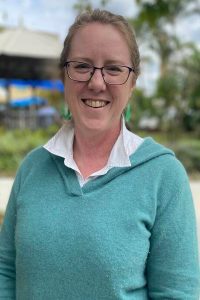
Dr Kathryn Colebourne
Because it’s National Stroke Week, today we’ll profile General and Acute Care and Acute Stroke Physician, Dr Kathryn Colebourne. Kathryn works across the hospital providing clinical assessment and treatment to acute stroke and medical patients, primarily in RAMS/EMU/DUIT and RAS Unit.
As part of a multidisciplinary team, Kathryn attends emergency calls and consultations throughout the hospital, and also leads a dynamic emergency Code Stroke response for patients who have either had strokes as an inpatient, or who have presented to emergency with an acute stroke.
Kathryn enjoys working with talented professionals across TPCH who are dedicated to minimising the devastating harm caused by stroke to patients and their families. She values being able to help save a patient’s brain function with the view to return the patient to their family and re-engage with their previous life, goals and hobbies.
Outside of work, Kathryn loves travelling, learning about new cultures, and trying to speak other languages. A nature enthusiast, she enjoys gardening, growing different plants to create a biodiverse and healthy environment, and feeding the wildlife! Kathryn also enjoys skiing in the winter and going to plays with her nieces and nephews, having fun embarrassing them with her bad Aunt jokes!
Shout out
Today’s shout out goes to all the staff across TPCH who supported the go live of the new ESM (Enterprise Scheduling Management) system this week. The implementation was a huge undertaking, requiring several months of behind-the-scenes work to ensure staff were well prepared for the change. I congratulate the staff at TPCH for their excellent efforts in making the transition as smooth as possible, while continuing to deliver high quality services to our patients. There have been some challenges, but overall, the staff have adapted well to the new system.
Special thanks goes to Sharyn Trappett, Sarah Scott, Chantelle McPherson, Leah McCarthy, Sheree Ellis, Cheryl Ross, Nickie Morton, Lynelle Ferguson and Krissy Schaeller as well as the Health Informatics and Digital Metro North project teams. All were instrumental in supporting our staff and patients during the changeover. Well done!
Closing thought
This weekend I’m off to run in the 14km City to Surf in NSW. This is a short training run for me; I usually run ultra-trail, my favourite distance events are 100km. Long distance running requires patience and resilience; to keep going when things get tough, when your mind tells you “you can’t,” or just don’t want to.
When I run these long distance events, there are a few really important things, and funnily enough they are the same things that see me through my work day.
- Smile – it makes you feel better
- Belief – you can do this
- Thinking about the next steps (most important!) in an ultra-run, not only so you don’t fall over but so that you keep focused on the end goals. The old adage of eating the elephant in chunks is so true!
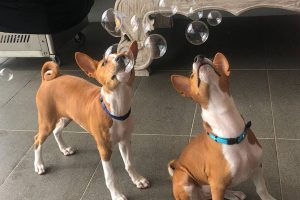 In the case of a long run, you focus not on the end but on the next aid station or, when you will see your support crew. An encouraging smile or work from someone you know or trust is worth more than anything. (Remember this as you talk to your patients or colleagues on a challenging day!)
In the case of a long run, you focus not on the end but on the next aid station or, when you will see your support crew. An encouraging smile or work from someone you know or trust is worth more than anything. (Remember this as you talk to your patients or colleagues on a challenging day!)
The same applies to working in health care. Showing support and encouragement to our colleagues and patients during challenging times, can make the ‘daily race’ a little easier and the achievement so much sweeter.
As I said to a few people this week, life is always better with bubbles!
“A life is not important except in the impact it has on other lives.” Jackie Robinson
Karlene.